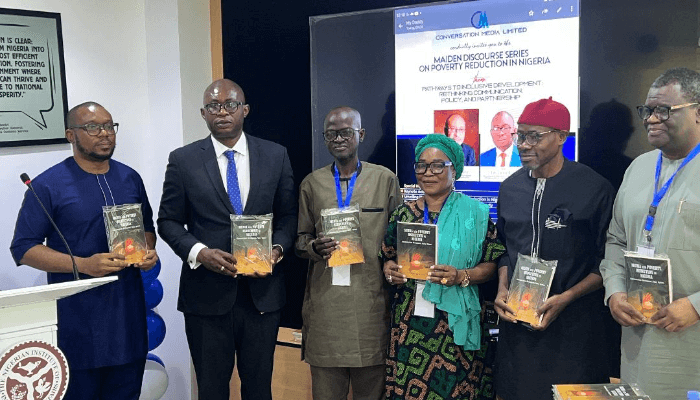Nigerian media tasked to drive inclusive communication for poverty reduction
…As new book urges shift from urban bias to community-driven communication
Experts and scholars have called for a redefinition of the media’s role in tackling Nigeria’s deepening poverty, urging a shift from elite-focused coverage to grassroots-driven communication that empowers citizens and informs policy.
They spoke on Friday at the public presentation of a new book titled ‘Media and Poverty Reduction in Nigeria: Communication, Development, and Policy Options’ by Victor Ikem PhD, held in Lagos to commemorate the United Nations International Day for the Eradication of Poverty.
In his welcome address, Ikem, a communication strategist, who is also the convener of the event, said the annual dialogue was conceived to “sustain inclusive conversations” among policymakers, the media, academia, and civil society on poverty eradication.
“October 17th every year has been set aside by the United Nations to promote concrete action toward ending poverty across the world,” he said.
“In Nigeria, we continue to face the consistent challenge of people’s inability to earn sustainable income and live in dignity. Despite numerous interventions by successive governments, poverty remains widespread, affecting over 139 million Nigerians,” he further said.
He described the forum as “the beginning of a difficult series we intend to hold every 17th of October,” emphasising that meaningful engagement between media, government, and the public is essential to reversing the trend.
Media must move from rhetoric to structural change – Adi
Delivering the keynote address, Bongo Adi, a professor and senior faculty member at Lagos Business School, commended the author for interrogating how media structures affect poverty narratives in Nigeria.
Adi argued that while the media has been active in highlighting government shortcomings, it often fails to connect policy discussions to the lived realities of poor Nigerians.
He said: “We need to stop romanticizing the idea of poverty as statistics and begin to treat it as a human condition that demands institutional responses. Media framing is critical; it shapes how policymakers and citizens perceive urgency.”
The economist noted that without deep reform in communication structures, anti-poverty programs will continue to be poorly designed and executed. “The link between policy failure and weak communication is direct. If the media doesn’t bridge that gap, poverty will persist as a governance failure,” he added.
Media’s potential in poverty reduction largely unfulfilled – Reviewer
In his review of the book, Humphrey Akanazu, an associate professor and the executive principal of Docenti Global Business School, described it as “a challenging and essential examination of the media’s largely unfulfilled potential in a nation facing the paradox of wealth and widespread destitution.”
According to Akanazu, the 136-page publication interrogates why the Nigerian press, despite its proliferation, has failed to drive poverty-related discourse meaningfully.
He added that the author’s proposed policy options were “strategic and actionable,” advocating for a paradigm shift towards community-based communication, especially through indigenous-language broadcasting and community radio.
“The author argues that to become a true partner in poverty reduction, the media must overcome challenges like political interference, commercial pressures, and poor working conditions,” Akanazu noted.
He cited the example of the National Social Investment Programme (NSIP), which the author described as a federal initiative constrained by weak communication strategy and poor coordination. “For these interventions to succeed, communication must be central, it builds trust, fosters awareness, and ensures the poorest benefit,” he said.
Akanazu also drew attention to the South-South region, which he called “a paradox of resource wealth and socio-economic deprivation.” Despite being the engine of Nigeria’s oil economy, he said the region suffers from high multidimensional poverty, poor access to clean water, and unemployment, issues that effective communication could help address by holding policymakers accountable.

